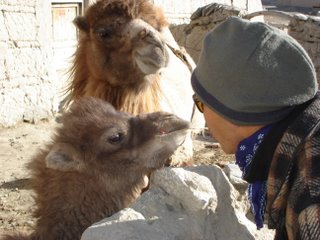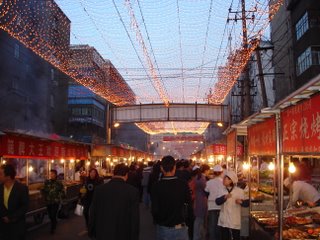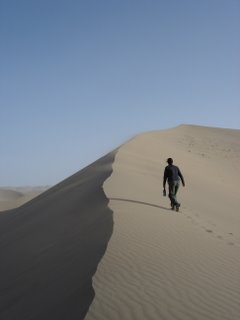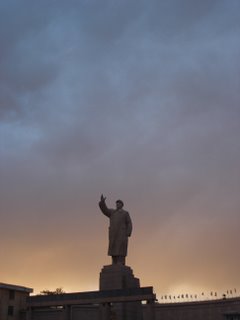Last Days in Kathmandu
With some downtime in Kathmandu as our Tibet visas were processed, we went rafting and checked out Bakhtapur, an old town outside the city. We also managed to avoid buying last minute souvenirs, which we'd have to drag across China. It was tough, with everything so cheap.
I did stock up on books, though, at Kathmandu's great used book shops. Theyre way better than the ones at home, which is saying something considering Berkeley is a university town with many learn-ed residents. Here, travelers sell books for peanuts instead of hording them on their bookshelves. So you can find great new stuff like Jhumpa Lahiri, classics like Eliot (who Jen can't get enough of for some reason), and the standard Brown/Grisham/Crichton paperbacks at good prices.
The fear of having nothing to read gnaws at me constantly, so I bought a reassuringly large stack before taking off, figuring English books would be hard to find in China. Every time I meet an English-speaking tourist, I ask if they have anything that they've already read and beg them to trade used books with me.*
We got out of Kathmandu just in time. Nepal is a mess nowadays. Basically, all the political parties have made an agreement to work towards a multiparty democracy with the Maoist insurgents. They planned a series of strikes and demonstrations in early April. The King sees the agreement as a threat to his power. So he issues a curfew and threatens to clamp down on all political demonstrations. Already, the royal army has been arresting suspected dissidents for some time, doing god knows what with them. The Maoists contribute to the mess by continuing to blow up things. At the end of the day, it's regular people like shopowners, travel agents, restaurant workers - people that depend on tourists - that suffer. Nobody likes the King or the Maoists.
The Border
On April Fool's Day, Jen and I boarded a minibus for the border, then switched to a 4wd Land Cruiser in Tibet. The border crossing (our first via land) went smoothly, thanks to the Nepali and Tibetan guides handling all the paperwork (and the Chinese LOVE their paperwork). Just before entering Tibet, a guy ordered us to take off our backpacks and line them up against a wall. He then sprayed the packs with a chemical to kill every possible organism that could be trying to sneak across the border without proper papers. The poor Nepalis and Tibetans walking across just covered their mouths as the guy sprayed down the loads on their backs.
The fact that we'd entered China immediately became clear as the crummy old Nepali brick buildings were immediately replaced by crummy new Chinese concrete buildings.
Seven Days in Tibet
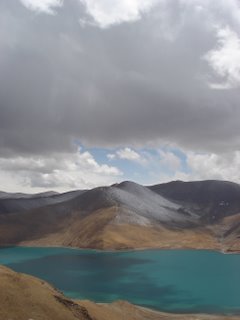
We spent seven days, six nights in a Land Cruiser with two Tibetans (a guide and a driver), two Dutch guys over 6'5", and four big packs. Kind of crowded, so we took turns sitting on the spare tire in the trunk. I'd say 85% of the ride was on dirt roads, 10% on paved roads, and 5% on some kind of cross-country trail that you couldn't really call a "road." We saw incredibly bleak and gorgeous deserts, drove over several 5000+ meter passes with webs of prayer flags fluttering in the wind, stopped at isolated Tibetan villages populated by semi-nomadic yak herders, and got out of the truck to urinate in some truly spectacular, desolate spots.
But honestly, the drive satisfied any urge I had to go trekking in this region. It was windy, cold, dry, and while incredibly beautiful, the landscape was best appreciated from inside a warm SUV. We met a guy who was biking a similar route and the whole time I kept thinking how rough it would be to slog though the wind, sand, altitude, and below freezing temps everyday. I also saw another bike tourist going from Lhasa to Kathmandu who looked like a Mad Max extra - big aviator goggles, sand in all his stuff, totally sun and wind burned.
Although the route sees its fair share of travelers moving between Lhasa and Kathmandu, it didn't feel touristy at all. For the most part, local people seemed to maintain their cultural identity and few go out of their way to serve tourists and earn their dollars. Folks still typically dress in traditional clothing, and not just so they can charge you to take their photo.
The sheer toughness of rural Tibetans, living in ridiculously harsh conditions, is amazing. We'd see guys herding their yaks in below freezing temps, dust and sand blowing everywhere, their faces like leather, hair long and wild. Eastern Tibetans, in particular, are pretty big, rough and ready. They wear red cords braided into their hair, leather boots, and big sheepskin vests. You wouldn’t want to get into a bar fight with one of these guys (or the women, either, for that matter). At the same time, all the Tibetans we've met have been friendly, warm, easy going, and quick to laugh.
Food and Lodging
With the exception of Everest base camp, we stayed in guest houses of varying quality, depending on the size of the town. Lodging ranged from a concrete room with old mattresses and a single light bulb to a room with cable, carpeting, and a big thermos of hot water for tea.
No matter the quality of the hotel, however, the food was mediocre at best. Mostly greasy noodles and other fried stuff. Nothing inspiring. Even the traditional Tibetan momos (like pot stickers), which we really liked in Nepal, were rubbery and often lukewarm. Bad enough to make me miss Nepali cuisine. In fact, when we got to Shigatse, the second biggest town in Tibet, we went straight to the Nepali restaurant and had some dal baht. OK, so it's one of the most isolated, unarable regions in the world - I can see why the food ain't all gourmet and shit.
Actually, we were excited to try yak butter tea, a Tibetan staple, simply because we’d heard stories about how disgusting it was. (Lonely Planet claims it tastes like someone washed their socks in it.) The Snow Leopard and Seven Years in Tibet also heavily featured the drink. It's basically a smoothie made of black tea, yak butter, hot water, and salt - how bad could it be? Hey, I love smoothies! So on our first night on the road, we walked into a dive where the customers were warming themselves over bare electric coils. We ordered a big thermos for the four of us (me, Jen, the two Dutch dudes). So...it’s not THAT bad. I mean it's really rich and, um, salty, and, ok, not so good. Also, I now associate it with the nausea and headache of altitude sickness.
Base Camp

On the way to Lhasa, we spent a night at Everest Base Camp, and enjoyed spectacular views of the mountain. With the clear blue sky and thin air, it looked like you could reach the peak in a solid day's climb, as opposed to the actual multi-week ordeal. We have great pictures.
Base camp, a 2-hour hike up from the Land Cruisers, is a tent city set up by entrepreneurs to serve tourists, expedition members, sherpas, and porters. Each canvas shelter (looks like Frisbee Central at an ultimate tournament) is like a mini-guesthouse. They'd give you a hard bed, all the blankets you wanted, a choice between fried rice, noodle soup, and omelettes, and all the free tea you could drink (which fortunately included jasmine as well as yak butter tea). You could also get cans of Budweiser and Pabst Blue Ribbon, the Official American beers of Tibet. The lady of the house even tucked us in.
The downside of spending the night at 5000+ meters was that we all suffered from altitude sickness. I felt nauseous and had a headache in the morning. (Also, I'd gotten up to take a leak in the freezing cold three times because of all the tea I'd drunk.) Jen had "the worst night of her life." One of the Dutch guys threw up and couldn't walk straight. He had to get a pony ride back to the Land Cruisers. There's no avoiding it - we just gained too much altitude too quickly coming from Kathmandu.
I think the smoky, sickly sweet smell of burning yak dung, which they use here instead of firewood, also made us all a little ill. I will forever associate this smell with Tibet, though I can't imagine where else I'm going to run into it.
Sanitary conditions at base camp were a disaster. Because the tower of feces had extended a couple of inches past the hole, people make do, literally, wherever. At least the cold keeps away the flies and dulls the smell.
China and Tibet, Best Buddies
On the plus side, the insane days of the Cultural Revolution are over. No longer are Red Guards knocking off monasteries, temples, and people across the region. Tibetan Buddhism is tolerated, at best, and Tibetan culture is allowed to exist in a non-threatening forms like cultural shows and pilgrimages.
On the negative side, Tibet essentially remains a police state. Photos of the Dalai Lama are prohibited, dissidence is not tolerated, and you certainly aren't going to find any copies of Seven Years in Tibet floating around. Try Googling www.freetibet.org while in China. The link appears on the search list, but you can't connect. This screened version of web searches reflects the deal Google recently struck with the Chinese government.
Furthermore, instead of brute force, the Chinese gov't has adopted a more subtle and arguably effective approach by slowly smothering Tibetan life with cultural domination. Thanks to a concerted effort by the government to get Han Chinese to move here, Lhasa, once the center of Tibetan culture, has become a typical Chinese city with some Tibetan bits. Various economic and employment incentives for mainlanders to move to Lhasa threaten to make Tibetans a minority in their own capital. In 2007, a new rail line will open up Lhasa to the rest of China even more, further eroding Tibetan life. The Dalai Lhama, currently in exile in India, has intimated that he may be the last in the line because he will not locate a replacement reincarnated form in occupied Tibet.
That being said, the remaining Tibetan elements of Lhasa are impressive. The Potala, the Dalai Lama's historic winter residence and probably the world's most imposing building, is worth a visit. The steady stream of rural pilgrims throughout town, wandering around , spinning hand-held prayer wheels, is fascinating. And again, despite a fair number of tourists here, it doesn't feel the least bit touristy. Only a handful of restaurants serve Western food, there are no t-shirt shops or even money exchangers, and few people speak English. Mainland Chinese tourists, however, are well taken care of, with numerous hotels and eateries catering to their needs.
How Are We Doing?
In general, pretty good. I recently had a minor bout of the runs, Jen had a small head cold, but otherwise we've stayed pretty healthy.
More of an issue than our physical health, however, has been our mental health. When we first got to Nepal we found ourselves at a low. We’d been away for 4 months, and the constant traveling had worn us down, something I never thought would happen. Kathmandu's sheer foreignness also proved exhausting to us in this low-energy state. We missed stupid things like cereal in the morning, comfy bathrooms, movies. We missed our friends.
On a day to day basis, we'd both go back and forth on our travel plans, alternately thinking “Screw it, let's just go home in mid-May like we planned” versus “This is the trip of a lifetime. Let's do it right and take our time.” Things like the quality of breakfast on a particular day or how friendly the bus driver was would change my mind. An hour or two of hanging out with a fun English-speaking tourist would strengthen my resolve. I liked to think that I was tough enough to keep traveling, but felt embarrassingly attracted to the comforts of home.
We delayed the decision until we'd finished our 3-week trek, figuring we'd be in a more positive state of mind after some walking in the mountains. That turned out to be a good thing. We had a great time on the trek, met lots of nice people, and then spent a few days just relaxing in Pokhara, a quiet town near Annapurna with comforts like fresh brewed coffee, cable TV, and oatmeal. After some minor hemming and hawing, we figured 6 more weeks was the way to go. That would allow a comfy pace through Tibet and China, but would avoid burnout, getting caught in the thick of monsoon season, and the evaporation of all our cash. So that's it, we're back at the end of June.
I realize how incredibly indulgent it is to stress about how much longer we're going to extend our vacation. This is not lost on me, trust me. Everyday, I’m thankful for this trip. But at the same time, I’m excited to see my friends, share pictures, and reminisce about how great the trip was.
It's weird to look forward to the reminiscing, but that can be best part. While traveling, you're regularly challenged and often uncomfortable. For every high, you hit multiple lows. It's not all mountain passes and delicious street food on sticks. Mostly, it's sitting on cramped buses, getting ripped off, washing filthy socks in the sink, and killing time in airports. But afterwards, all you remember are the good bits, and even the bad parts seem exciting and exotic.
Where to Next?
We're headed up to northwest China - Muslim, Silk Road territory. This area sees very few tourists, Chinese or otherwise. Travel infrastructure is bad, and with neither of us speaking Mandarin, getting around will be a little daunting. I'm going to take Jen Kahn's advice and draw up little flashcards with pictures of buses, beds, etc. I'm also getting into pantomiming everything. Though today I could not explain alcohol based hand cleanser (aka Purel) to the ladies at the supermarket. They offered me hand lotion, clothes detergent, and handi-wipes, but no Purel. It may not exist here.
* In case you're interested, I got:
The Ground Beneath Her Feet, Salman Rushdie - I read him for the first time on the Annapurna Circuit and liked him a lot. A little like a foreign film that you might not always enjoy as you're watching it, but then you think, "Hey, that was pretty good" afterwards. More importantly, the book is huge and dense so it'll last a long time.
Seven Years in Tibet, Heinrich Harrer - Just finished this. No one will ever accuse him of being a great writer, and he could very well be a Nazi, but it was good to read this right before hitting Lhasa. Shows life here before the Chinese invasion, I mean "liberation."
Red China Blues, Jan Wong - Reading it now. Memoir of a Chinese Canadian college student who comes to Beijing as a hard core Maoist at the tale end of the Cultural Revolution. She then proceeds to have her idealism busted by the reality of life under Mr. and Mrs. Mao and the Gang of Four. Good history lesson. Really disturbing account of the Tianamen Square Massacre when she returns as a foreign correspondent.
Waiting, Ha Jin - I figured I had to read something that wasn't bashing China. Some kind of comedy novel set in modern China?
Glue, Irvine Welsh - He wrote Trainspotting, which was supposed to be great. But this book is longer and therefore better. The dialogue is all in Cockney English (phonetically spelled out) so we'll see.
Some trashy paperback I managed to wheedle out of a Dutch guy. One of the reviews says it "would make the perfect Tom Cruise movie." Um, is that a good thing or a bad thing?



